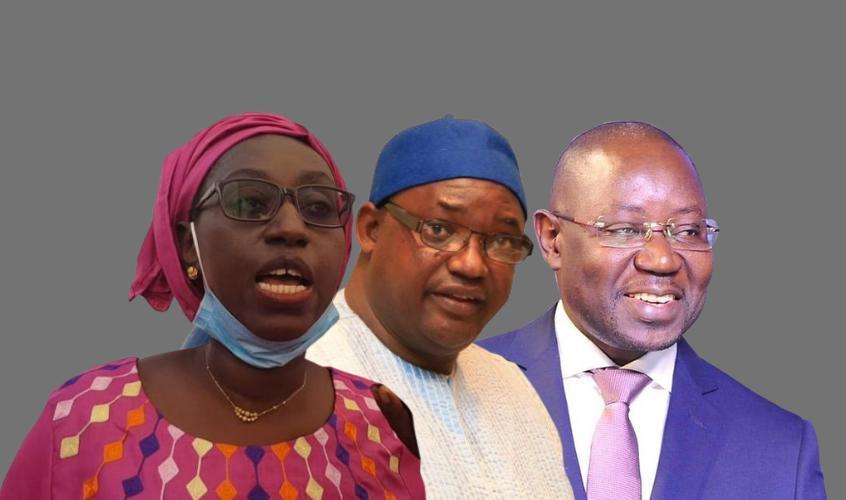Africa-Press – Gambia. The ruling National People’s Party (NPP) Grand Alliance has reacted to Banjul South NAM Fatoumatta Touma Njai’s calls for President Barrow to not to seek a third mandate..
The outspoken NAM told West Coast radio recently that President Adama Barrow would not have expressed interest in reelection beyond his second term if he genuinely loves the country.
But reacting to her claims in a Standard exclusive, the NPP Grand Alliance secretariat said the NAM’s comments represent a deeply flawed understanding of democratic governance, constitutional law and The Gambia’s remarkable transformation under President Barrow’s leadership.
The statement reads in relevant parts as follows: “Hon Touma Njie needs a brief lesson in an aspect of Gambian history. First, going by her fallacious reasoning, Sir Dawda Jawara, the first president of The Gambia who served for 32 years without term limits and presided over some of the worst corruption scandals, including financial pillage of some SoEs such as GPMB and incompetent mismanagement and bankruptcy of Gambia Commercial Bank and Agricultural Bank, etc, did not love The Gambia. It reached a point when the entire government went bankrupt, necessitating massive retrenchment and one of the most difficult and painful economic recovery programmes in the 1980s in the entire Sahel.
“This is not to excuse corrupt conduct. Let it be clear that the NPP- Grand Alliance strongly condemns corruption and corrupt practices. We will continue to advocate for stronger implementation of the laws against corruption and we encourage the president to pursue a bold new approach against corrupt practices.
With her allegations, Hon Touma Njie fundamentally misunderstood her constitutional obligations. Her failure to personally invoke her constitutional powers to lead her crusade in the courts raises serious questions about whether her allegations are politically motivated rather than evidence-based. The Constitution grants NAMs the authority to summon officials, demand documentation and initiate accountability proceedings even in court, if necessary. Her choice to resort to media statements rather than Constitutional remedies suggests a lack of commitment to the very democratic principles she was elected to uphold.
“Furthermore, while she accused the administration of corruption without providing evidence, serious allegations persist regarding corrupt practices involving people close to her, allegations that remain unaddressed and unprosecuted.
The contention that presidential tenure determines love of country is intellectually bankrupt and historically refuted by numerous examples of distinguished leadership across developed democracies. Angela Merkel served as Chancellor of Germany for 16 years from 2005 to 2021, leading Europe’s largest economy through multiple crises including the 2008 financial crisis, the European debt crisis, and the COVID-19 pandemic. Germany experienced unprecedented economic stability and growth under her extended leadership.
Lee Kuan Yew of Singapore led his nation for 31 years, transforming Singapore from a chaotic colony into one of the world’s most prosperous nations. His extended tenure enabled comprehensive long-term planning that created the modern Singaporean miracle. Similarly, leaders in Switzerland, the Netherlands, and other advanced democracies have served extended periods, contributing to their nations’ prosperity and stability. Examples of Gulf leaders, UAE, Qatar, etc, India, China, and other fastest developing economies debunk the basic contention of term limits.
The principle remains that democratic legitimacy derives from popular mandate, not arbitrary tenure restrictions. These examples demonstrate that effective governance requires continuity, institutional memory, and the ability to implement long-term developmental strategies that transcend electoral cycles.
The Gambian Constitution unambiguously protects President Barrow’s right to seek re-election. His Constitutional right to seek a third mandate in 2026 is therefore indisputable both legally and morally.
Any attempt to delegitimise this Constitutional right would constitute an egregious violation of democratic principles and the rule of law. As a lawmaker sworn to defend the Constitution, she should champion Constitutional rights rather than undermine them through baseless political rhetoric.
The Constitution serves as the supreme law, and all citizens—including presidents—enjoy equal protection under its provisions. Attacking President Barrow’s Constitutional right to seek re-election would establish a dangerous precedent that threatens the very foundation of Gambian democracy.
She is also sadly misinformed about the dynamics of the Gambian economy. The current economic difficulties facing Gambians are part of a global phenomenon affecting nations worldwide, particularly import-dependent economies in the Global South. The COVID-19 pandemic devastated global supply chains, while the Ukraine conflict disrupted energy and food markets, causing inflation to spike globally.
The Gambia’s economy, heavily reliant on imports for basic commodities, has inevitably been affected by these external shocks. However, President Barrow’s administration has demonstrated remarkable resilience in navigating these challenges.
President Barrow’s re-election in 2026 will ensure that the democratic institutions painstakingly rebuilt over the past eight years continue to strengthen and mature. The ongoing constitutional reform process, judicial independence initiatives, and civil service modernisation programmes require sustained leadership to achieve their full potential.
The Gambian voters will definitively reject unfounded allegations and politically motivated attacks when they vote in 2026. President Barrow’s record of achievement, Constitutional eligibility, and commitment to democratic governance provide an unassailable foundation for his re-election campaign.
The choice is clear: continue the path of democratic consolidation, economic transformation, and institutional strengthening under proven leadership, or risk regression through political uncertainty and unfounded allegations. The evidence overwhelmingly supports continuity under President Barrow’s visionary leadership.
Gambians understand that true patriotism lies not in limiting Constitutional rights through baseless accusations, but in supporting leaders who have demonstrated unwavering commitment to democratic values, economic progress, and national unity. President Barrow’s inevitable victory in 2026 will represent a resounding endorsement of these principles and ensure that The Gambia’s remarkable transformation continues unabated.
The ongoing development trajectory that has positioned The Gambia as a model democracy in Africa will not be disrupted by politically motivated opposition. Instead, it will be consolidated through the democratic mandate that Gambians will enthusiastically grant to President Barrow in 2026, ensuring continuity, progress, and prosperity for all Gambians.”
For More News And Analysis About Gambia Follow Africa-Press






